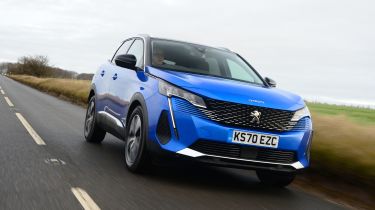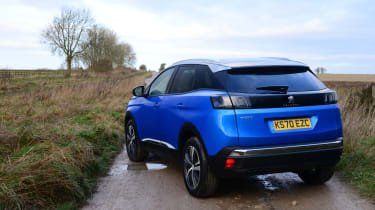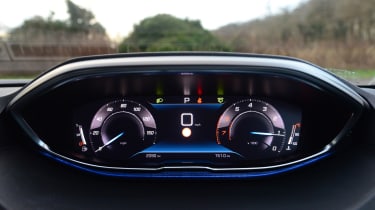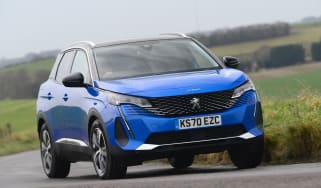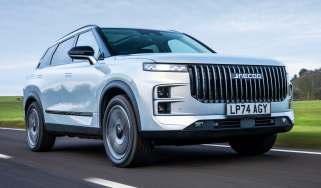Peugeot 3008 SUV - Engines, drive & performance (2017-2024)
The Peugeot 3008 is competent, comfortable and enjoyable to drive
If you’re looking for a family SUV that offers a high ride height with good visibility and is easy to drive, then the Peugeot 3008 might be the right choice for you. If you’re after a family car that feels great to drive, then you’d be better off looking at other SUVs like the BMW X1, or even considering a conventional hatchback like the SEAT Leon or Ford Focus.
We've found the Peugeot 3008 to be impressively composed on an open road, but it doesn't encourage you to drive it harder and isn’t likely to set our pulse racing. There’s little body lean to speak of, yet this doesn’t come at the expense of comfort, as the suspension makes a decent fist of softening pitted tarmac and soaking up potholes. The 3008 is also easy to drive around town, while it’s impressively quiet and civilised on the motorway.
The SEAT Ateca may have slightly sharper steering and stiffer suspension, but the trade-off is it’s less comfortable than the 3008, which is well-rounded in every aspect of its driving characteristics. It has the Nissan Qashqai and Renault Austral soundly beaten in the enjoyment stakes, coming off well in comparison to the sharp-handling Volkswagen Tiguan, while the Ford Kuga and Mazda CX-5 steer slightly more sweetly.
There’s no four-wheel-drive option for the non-hybrid 3008, but Peugeot’s ‘Grip Control’ setup (which is essentially a sophisticated traction-control system) costs between £250 and £500, as it requires 18-inch alloy wheels, which aren’t standard on all trims. It should help you out in slippery conditions, particularly if it’s paired with the optional winter tyres.
More reviews
Both plug-in hybrids are much heavier than the petrol models and, while they offer great straight-line acceleration, the extra weight makes them feel much more cumbersome through corners.
Peugeot 3008 petrol engines
The 128bhp 1.2-litre PureTech petrol engine in the Peugeot 3008 uses turbocharging to help keep performance up and running costs down, and it’s familiar from other models. The automatic gearbox that now comes as standard with this engine also impressed us, as it changes gear smoothly, quickly and with minimal fuss.
With this engine fitted 0-62mph takes 9.7 seconds, so it’s neither blisteringly fast nor painfully slow, although that time is likely to increase if you load the 3008 with passengers and luggage. It's impressively linear in its power delivery, and feels powerful enough for cruising on the motorway and overtaking slower traffic.
From mid-2023, Peugeot also introduced a mild-hybrid-assisted version of the 1.2-litre engine, which the maker claims can drive using only its 28bhp electric motor for up to 50% of the time in urban driving. It also gets a new six-speed dual-clutch gearbox and feels noticeably different to drive, with a more relaxed feel as you pootle in traffic and manoeuvre at lower speeds. Tackle faster roads, however, and the effect from the electric motor is far less noticeable, with the small petrol engine proving much more audible as the revs rise.
Hybrid engines
Not every family car is offered with a plug-in hybrid version but the Peugeot 3008 has two to choose from. They both combine a 1.6-litre petrol engine with a battery (12.4kWh in the 180 and 14.2kWh in the 225) and one electric motor, and use Peugeot’s eight-speed ‘EAT8’ automatic transmission. A flagship version with two electric motors and 296bhp – badged the Hybrid 300 – was previously available, but was later discontinued. However, its high price tag and unnecessarily high power output means it’s hardly missed.
The front-wheel-drive Hybrid 180 is the most affordable of the remaining plug-in hybrids, with 178bhp propelling it from 0-62mph in eight seconds, while the 222bhp Hybrid 225 has a 0-62mph time of 8.9 seconds, due to the added weight of its slightly larger battery pack.
Diesel engines
Many buyers after a family SUV still want a diesel engine, so Peugeot offers one. Like the petrol, it’s now only paired with an eight-speed automatic gearbox. Again, it’s a staple Peugeot product, but the petrol is still better suited to most drivers. The 128bhp 1.5-litre version is a little raucous when being revved, but once in a high-gear cruise, it’s admirably quiet. It takes 11.5 seconds to get from 0-62mph now the eight-speed automatic gearbox is the only option, which is a bit off the pace of most rivals.
The 99bhp diesel is no longer available, and it was the only model to come with a five-speed rather than six-speed manual gearbox, with no automatic option. We'd recommend avoiding this engine if you're looking at the used market, as it feels underpowered, especially with a full complement of passengers and luggage on board.
The more powerful 2.0-litre diesel engine was also discontinued with the arrival of the facelifted 3008. The 175bhp engine was also automatic-only and had some extra grunt, which was useful for towing. However, it was only offered in the top trim with a hefty price tag. For that reason, it was a rare choice. This engine manages 0-62mph in 9 seconds.
Which Is Best?
Cheapest
- Name1.2 Hybrid 136 Allure 5dr e-DSC6
- Gearbox typeSemi-auto
- RRP£35,660
Most Economical
- Name1.6 Plug-in Hybrid 195 Allure 5dr Auto
- Gearbox typeSemi-auto
- RRP£40,750
Fastest
- Name1.6 Plug-in Hybrid 195 Allure 5dr Auto
- Gearbox typeSemi-auto
- RRP£40,750

